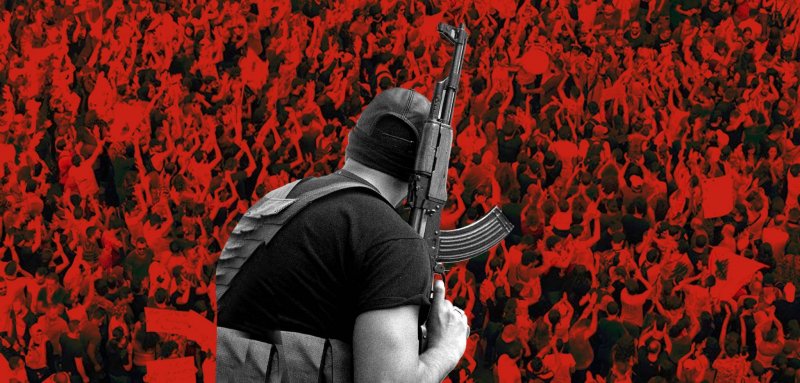Lebanon's recent uprising has posited Lebanon’s Shia population against the two major Shia parties, Hezbollah and Amal, in various regions across Lebanon. The two Shia parties which were founded to support the Shia underclass, a long-deprived segment of Lebanon, decided to stand in the face of their constituency.
As of the second day of the popular rising, the Amal movement deployed its armed militiamen to various parts of Tyre to confront the citizens demanding their economic and social rights. On the third day of the protests, a systematic crackdown was conducted, wounding men by the ammunition of the so-called "movement of the deprived."
As for Hezbollah, its secretary-general Hassan Nasrallah gave a speech filled with sympathy for the people who "could not endure new fees [taxes]" – but ultimately concluded that his party was against the downfall of the current government.
The speech held two messages: the first, a 'soft threat' to displace the anti-government protesters by deploying Hezbollah's supporters on the street, thus forcing the popular mobilization to move "somewhere else"; and the second which demonstrated Hezbollah's patriarchal politics with the statement "When the situation requires us to take the streets we will take the street, and we refuse any taxes on the poor segments [of society]" – in other words, he knows better the interests of the people and only he knows the right time to take to the streets.
The position of the two Shia parties did not arise from nowhere, it followed the anger displayed by their own Shia constituents towards them (as well as towards others); for instance, the protesters demonstrated in front of the home of Yassin Jaber, the MP of Amal, as well as his colleague Hani Qabisi in Nabatieh, the capital of Hezbollah, as well as in front of the office of Amal's delegate Ali Bizzi and his Hezbollah counterpart Hassan Fadlallah in Bint Jbeil. Chants were also directed at the speaker of Lebanon's parliament Nabih Berri and his wife in Tyre, the capital of the Amal movement, while other chants were directed against the head of the "Loyalty to the Resistance" bloc Mohammed Raed, whose office sign was vandalized in Nabatieh.
Hezbollah and Amal were unable to tell their constituency they can fend for them, preventing other sects from exploiting them and returning them decades to the past, when they were porters and doormen.
Amidst recent developments in Lebanon, the reality has become somewhat clearer: the ruling parties unite in the face of the people, Hezbollah and Amal lost the moral high ground that created them.
Perhaps the stance of the two Shia parties against the deprived and poor Shia citizens arises out of the realization that their poverty is not only specific to them but encompasses millions of Lebanese from other sects, following the failed economic policies which exacerbated economic difficulties throughout the country.
This time, Hezbollah and the Amal movement proved unable to tell their constituency they can fend for them, preventing other sects from exploiting them and returning them decades to the past, when the impoverished Shia used to work in Beirut as porters in the homes of well-to-do Sunnis and Christians – a memory which strengthened their sectarian affiliations. This strategy seems to no longer work however, simply because these Shia remain poor, and indeed, poverty reigns in most districts of Beirut itself, as well as the rest of Lebanon.
Perhaps the recent events have helped to reset the historical trajectory and make clear to the two Shia parties that they are considered part of the ruling regime, and indeed, the weightiest part of it during the past few years, along with the rest of the sectarian parties; the policies of all these parties and their deals, both under and above the table, have impoverished all Lebanese alike: Sunnis, Shias, Druze, Alawites and Christians.
Amidst these developments, the reality has become somewhat clearer: the ruling parties unite in the face of the people. As for the results of the continuation of the current climate, the next few days will herald the answers. Meanwhile, the change in the mood of the Shia street will see many more Shia go to the streets, with the largest losers being the Amal movement, a reality that the party is aware of – because these chants that have targeted its symbols have become an ordinary occurrence, by contrast to Hezbollah, which is still protected by red-lines that have not been fully passed yet.
Raseef22 is a not for profit entity. Our focus is on quality journalism. Every contribution to the NasRaseef membership goes directly towards journalism production. We stand independent, not accepting corporate sponsorships, sponsored content or political funding.
Support our mission to keep Raseef22 available to all readers by clicking here!
Interested in writing with us? Check our pitch process here!





